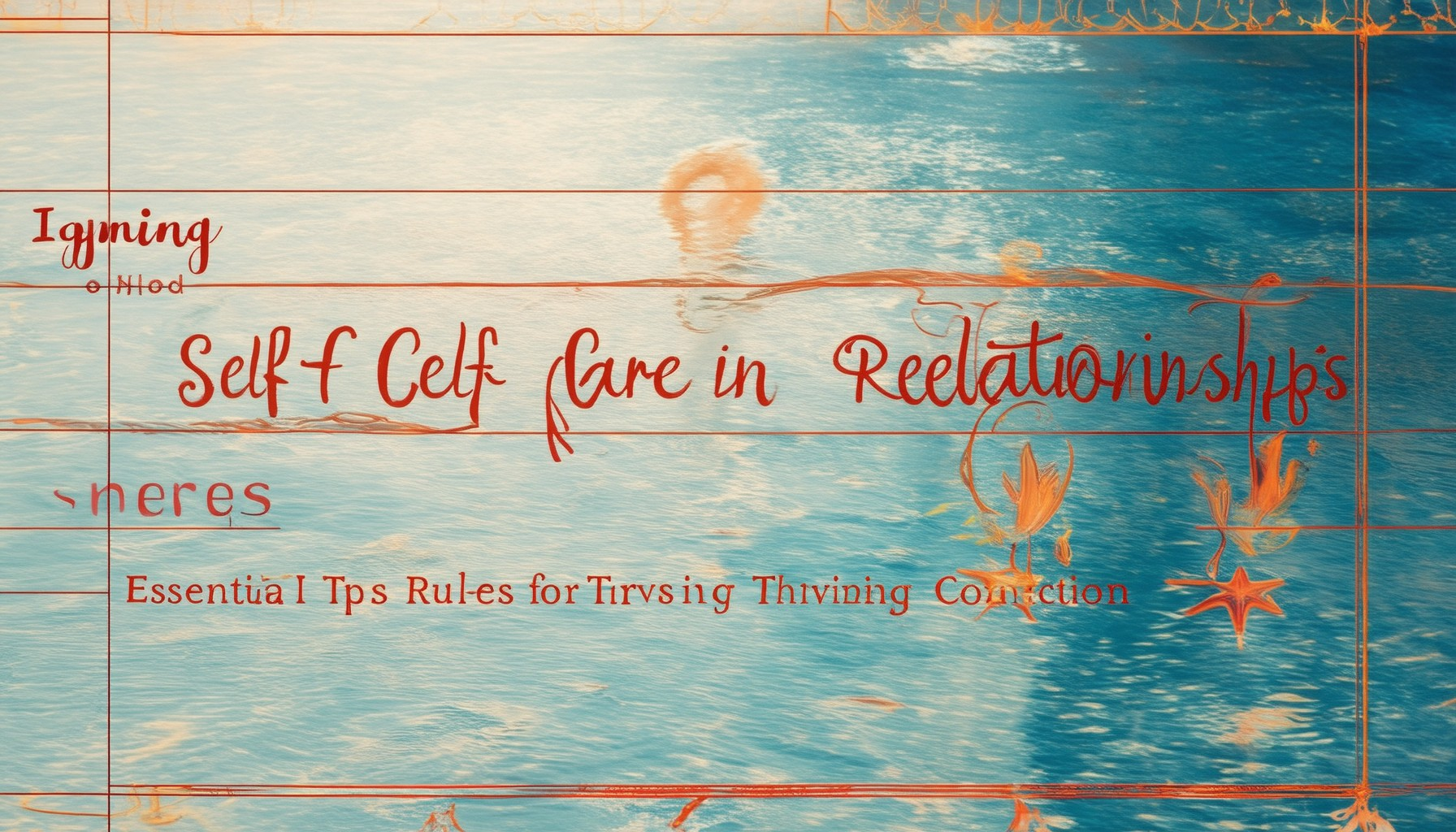In today’s fast-paced world, maintaining healthy relationships while taking care of oneself can feel like an impossible balance. Whether you’re navigating the complexities of love, career, or personal growth, prioritizing self-care is not just a luxury—it’s a cornerstone of strong, lasting connections. This guide delves into the essential tips and rules for integrating self-care into your relationships, helping you build deeper bonds and foster mutual support. From understanding the self-care wheel to mastering the 70/30 rule in relationships, we’ll explore how small, intentional changes can lead to significant harmony and fulfillment. Discover actionable strategies to overcome barriers, such as neglecting self-care or feeling overwhelmed by responsibilities, and learn how to prioritize your well-being while nurturing meaningful relationships. With expert-backed insights and practical advice, this article offers a comprehensive roadmap for anyone seeking to ignite self-care in their partnerships.
Key Takeaways
– Prioritize your well-being: Make your health and happiness a top priority to foster a thriving relationship.
– Foster emotional connections: Show empathy and actively listen to build a deeper bond with your partner.
– Maintain physical health: Focus on sleep, nutrition, and exercise to support both you and your relationship.
– Communicate openly: Be honest and respectful to express your needs while valuing your partner’s boundaries.
– Practice mutual respect: Acknowledge each other’s individuality and support personal growth.
– Set healthy boundaries: Protect your energy by clearly defining your limits and communicating them.
– Avoid narcissistic behavior: Ensure your actions promote empathy and balance in your relationship.
– Build strong, lasting relationships: By caring for yourself, you create a foundation for a fulfilling connection.
The 222 Rule in Relationships
The 222 rule is a simple yet powerful guideline for fostering a healthier and more fulfilling relationship. It consists of five key principles:
- Two Ears, One Mouth : Listen twice as much as you speak. This ensures effective communication and shows genuine interest in your partner’s thoughts and feelings.
- Two Eyes, One Heart : Focus on your partner’s emotional well-being by truly seeing and empathizing with their experiences.
- Two Minds, One Goal : Collaborate on shared objectives, whether personal or professional, to strengthen your partnership.
- Two Hearts, One Love : Cultivate mutual respect and appreciation, valuing each other’s unique qualities and supporting each other’s individual journeys.
By adhering to the 222 rule, you create a balanced and supportive relationship built on communication, empathy, and teamwork.
5 Tips for Self-Care
- Maintain a consistent mindfulness practice, such as meditation or deep breathing exercises, to reduce stress levels.
- Engage in regular physical activity, even if it’s just a short walk, to promote physical and mental well-being.
- Prioritize a balanced diet rich in fruits, vegetables, lean proteins, and whole grains to fuel your body and mind.
- Ensure you’re getting enough sleep, as it plays a critical role in emotional stability and recovery.
- Set healthy boundaries in your personal and professional life to protect your energy and mental health.
Understanding the 70/30 Rule in Relationships
The 70/30 rule is a popular concept often discussed in relationship contexts, emphasizing the importance of emotional connection over physical attraction. According to this principle, approximately 70% of a successful relationship stems from emotional factors like love, trust, and mutual respect, while the remaining 30% involves physical aspects such as attraction and passion.
This ratio suggests that while physical appearance plays a role in initial attraction, it’s the emotional foundation that sustains long-term happiness and satisfaction. A strong emotional connection fosters resilience, allowing couples to overcome challenges and maintain harmony despite differences in looks or other aspects of life.
Key Components of the 70/30 Rule
- Emotional Connection (70%) : This includes feelings of love, security, and understanding. Healthy communication and shared values are crucial for building this component.
- Physical Attraction (30%) : While important, physical attraction often diminishes over time, whereas emotional bonds can grow stronger with effort and commitment.
Adopting the 70/30 mindset encourages partners to focus on nurturing emotional intimacy while accepting that physical attraction may evolve over time. This balanced approach helps maintain a fulfilling and lasting relationship.
Signs of a 70/30 Relationship
- Strong emotional bond and trust.
- Shared goals and values.
- Regular communication and support.
- Ability to resolve conflicts constructively.
How to Strengthen Your Relationship Using the 70/30 Rule
- Communicate Openly: Share your thoughts and feelings to deepen your emotional connection.
- Focus on Shared Experiences: Engage in activities that strengthen your bond and create lasting memories.
- Be Patient and Understanding: Accept that relationships require time and effort to grow emotionally and physically.
By prioritizing emotional connection while embracing the natural changes in physical attraction, you can create a relationship that thrives on mutual respect and love. Remember, every relationship is unique, and finding the right balance is key to long-term success.
What is Self-Care in Relationships?
Self-care in relationships is the practice of prioritizing your emotional, physical, and spiritual well-being alongside the needs of your partner or significant other. It’s about balancing your own needs with those of someone else, fostering a healthy and sustainable connection.
Key Components of Self-Care in Relationships:
- Emotional Support : Recognizing and addressing your own emotions while also being present for your partner. This includes active listening, empathy, and validating each other’s feelings.
- Physical Well-being : Taking care of your health through adequate sleep, nutrition, exercise, and stress management, which indirectly benefits your relationship.
- Spiritual Health : Engaging in activities that bring you peace of mind, whether through meditation, religion, or simply spending time in nature.
- Communication : Being open and honest about your needs while also respecting your partner’s boundaries.
- Mutual Respect : Acknowledging each other’s individuality and supporting each other’s personal growth.
Benefits of Self-Care in Relationships:
- Stronger Emotional Connection : By focusing on your own well-being, you create a foundation for a deeper bond with your partner.
- Reduced Conflict : Managing stress and emotional challenges effectively can prevent misunderstandings and disagreements.
- Increased Satisfaction : Both partners feel valued and supported, leading to greater happiness within the relationship.
Challenges and Solutions:
- Balancing Priorities : It’s natural to sometimes neglect your own needs when caring for others. Practice setting boundaries and communicating your needs clearly.
- Common Misconceptions : Remember, self-care isn’t selfish—it’s essential for maintaining a healthy relationship.
Tips for Practicing Self-Care:
- Set Boundaries : Clearly communicate your limits and expectations.
- Find Joy : Engage in activities that bring you joy and fulfillment.
- Seek Support : Don’t hesitate to ask for help when needed, whether from friends, family, or professionals.
By prioritizing self-care, you create a nurturing environment where both you and your partner thrive, ensuring your relationship remains strong and fulfilling.
What Are the Three Rules of Self-Care?
Self-care is essential for maintaining mental, emotional, and physical well-being. Here are three fundamental principles to guide your self-care journey:
- Prioritize Your Well-Being : Make yourself a priority. Regularly check in with your emotions, needs, and overall health. Engage in activities that bring you joy and fulfillment, whether it’s spending time with loved ones, pursuing hobbies, or simply resting when needed.
- Set Boundaries and Stick to Them : Establish clear boundaries in your personal and professional life. Learn to say no when necessary and communicate your limits to others. This helps protect your energy and ensures you have time for yourself.
- Practice Gratitude and Kindness : Cultivate a mindset of gratitude by acknowledging the positive aspects of your life. Extend kindness to yourself and others, understanding that everyone faces challenges. Be compassionate during difficult times and remind yourself of your strengths.
By focusing on these principles, you can create a balanced and fulfilling life that supports your overall happiness and success.
Is Self-Care Narcissistic?
Self-care is not narcissistic. While both concepts involve focusing on oneself, they differ significantly in nature and impact. Self-care is about prioritizing your well-being to maintain balance in your life, fostering healthy relationships, and contributing positively to society. In contrast, narcissism is characterized by an excessive interest in oneself, often at the expense of others, leading to poor relationships and a lack of empathy.
Key Differences:
- Definition : Self-care is proactive and balanced, aiming to enhance your overall health and happiness. Narcissism is a personality trait marked by self-importance, a need for admiration, and a lack of regard for others’ feelings.
- Impact on Relationships : Self-care promotes empathy and understanding, allowing you to connect deeply with others. Narcissism often leads to superficial relationships and a tendency to exploit others for personal gain.
- Examples :
- Self-Care : Taking time for hobbies, setting boundaries, or practicing mindfulness.
- Narcissism : Ignoring others’ needs, dominating conversations, or refusing to compromise.
Importance of Balance:
True self-care recognizes the importance of giving and receiving love, support, and respect. A self-caring individual thrives in healthy relationships, understanding that their well-being depends on the well-being of others. Narcissists, on the other hand, struggle with this balance, often prioritizing their own desires over the needs of loved ones.
Conclusion:
Self-care is a healthy and constructive practice that enriches your life and strengthens your connections with others. Narcissism, however, is a destructive trait that negatively impacts relationships and personal growth. Understanding and embracing self-care allows you to live a fulfilling, empathetic, and balanced life.









0 Comments